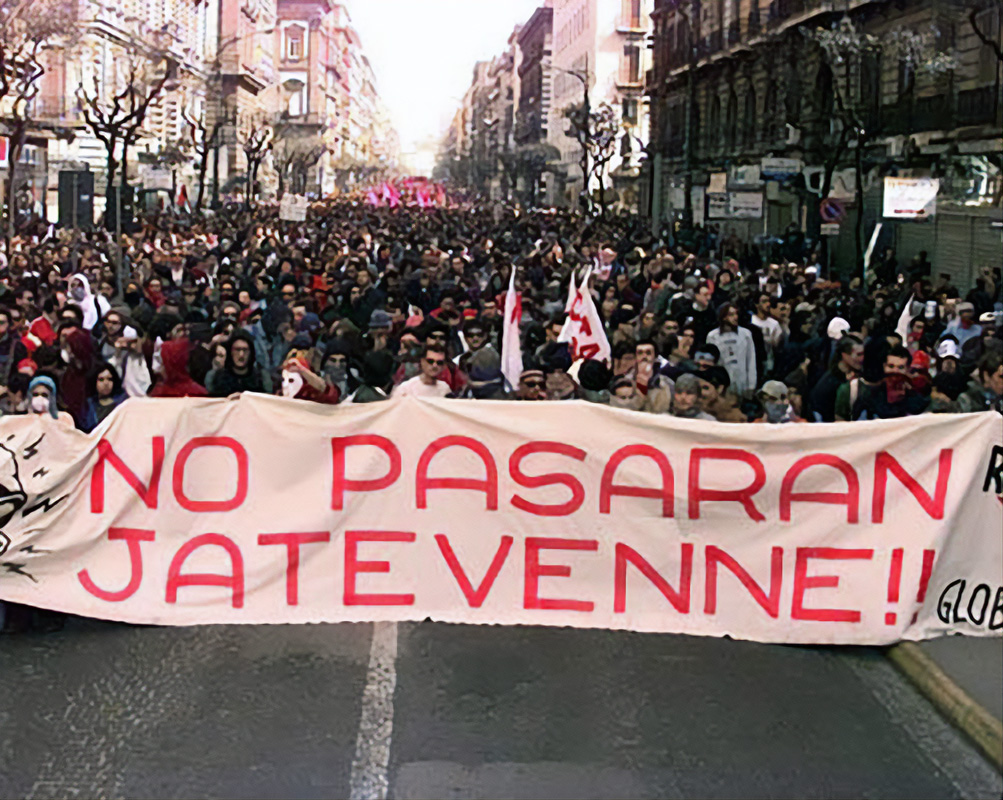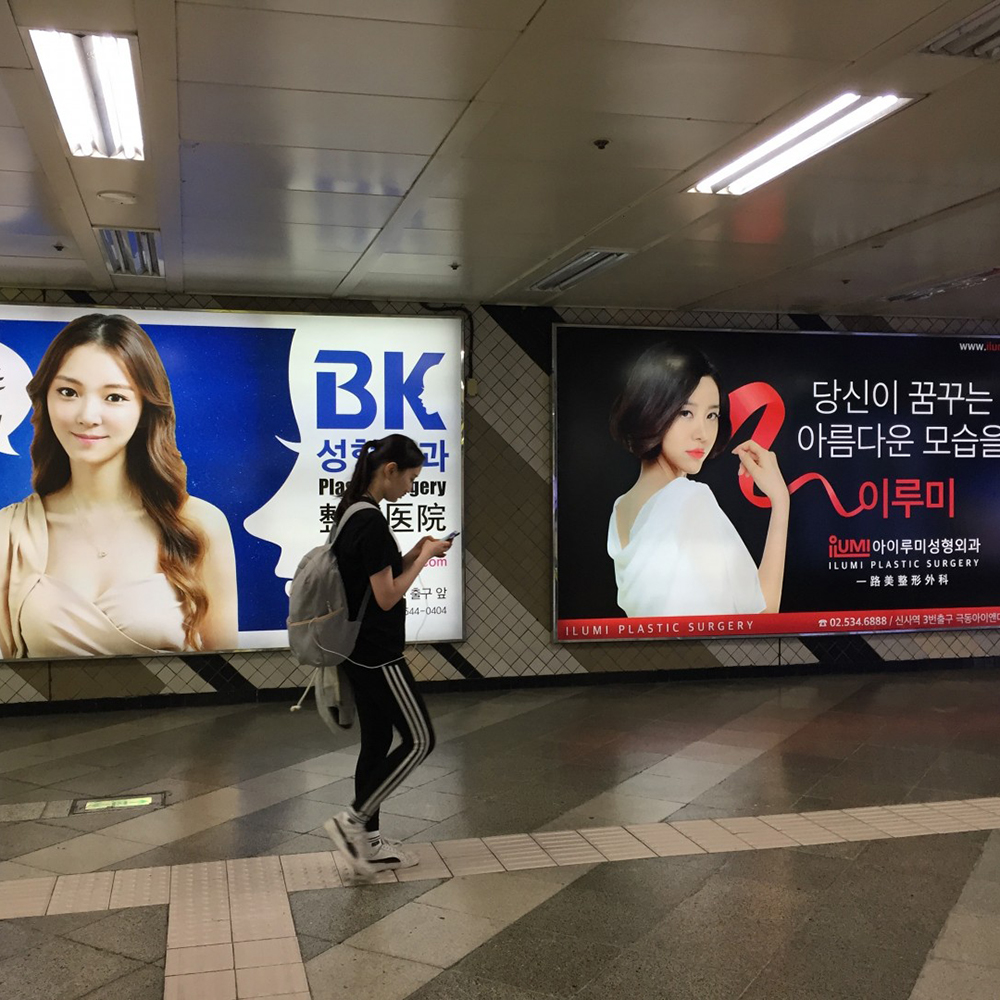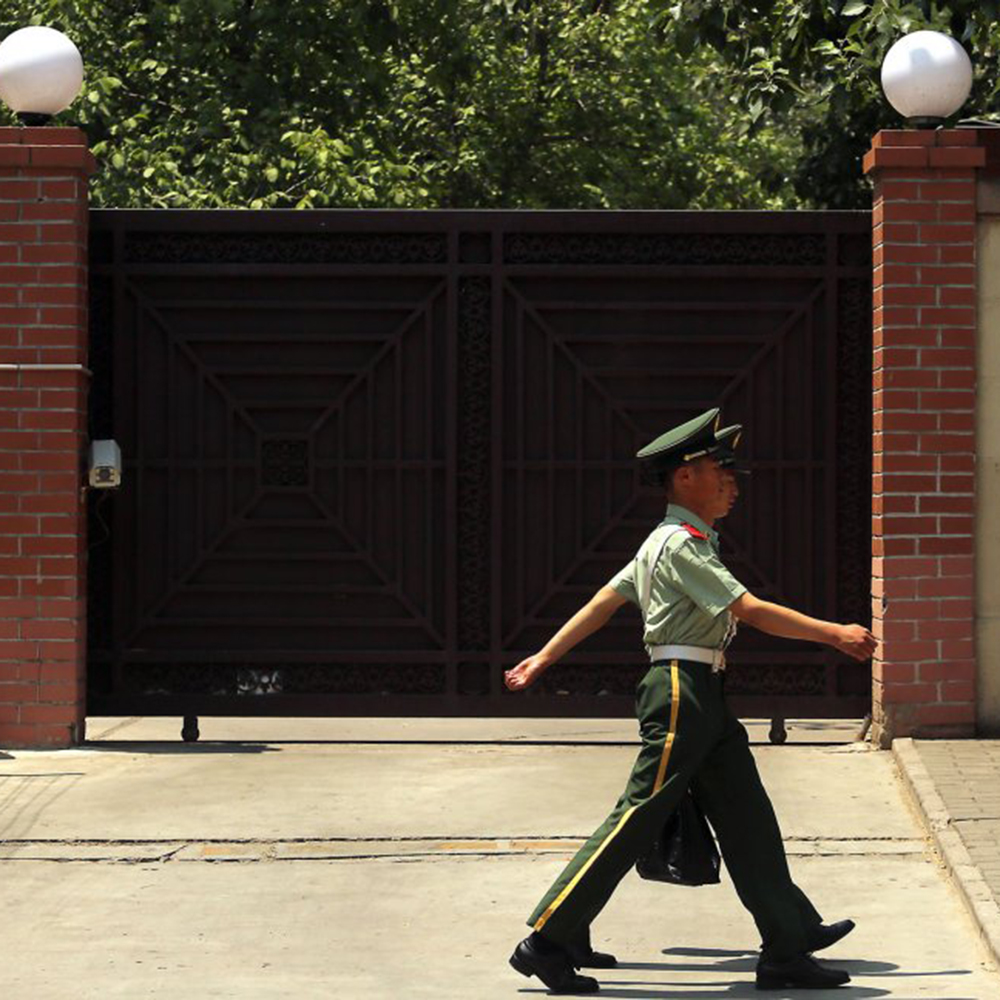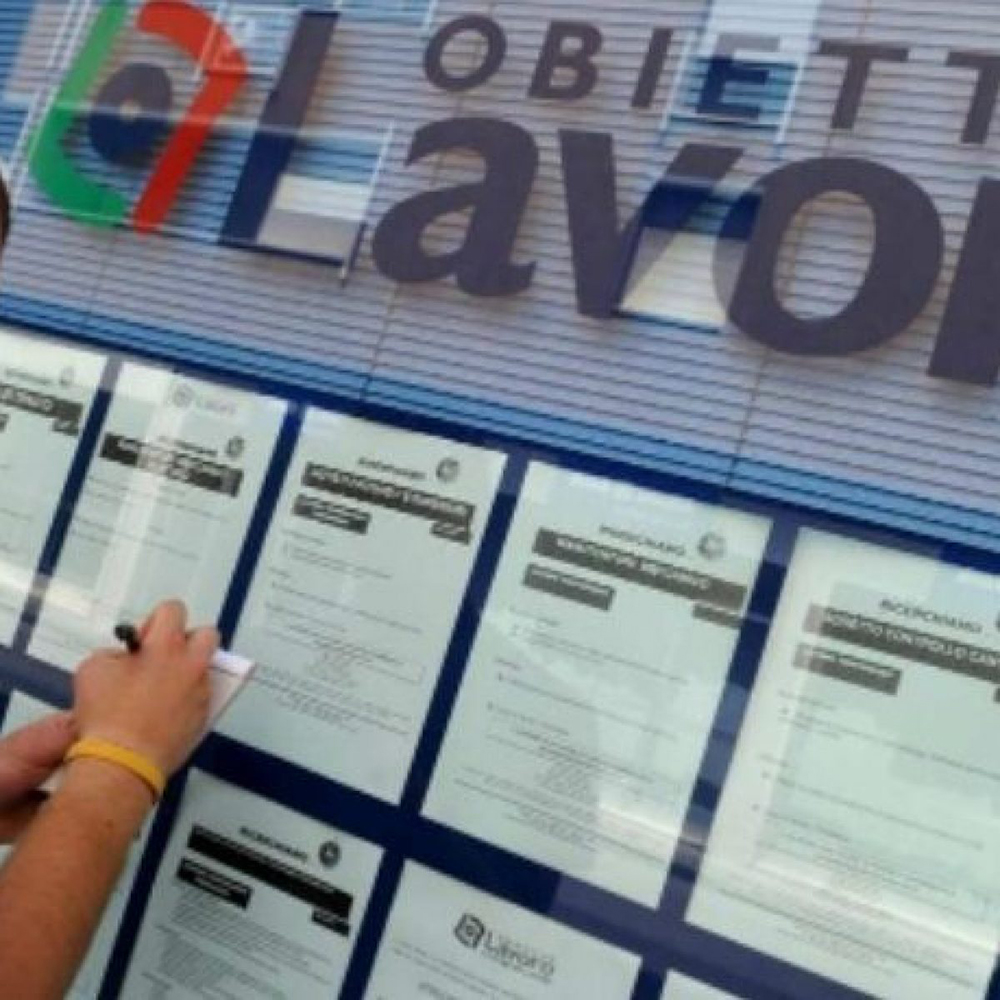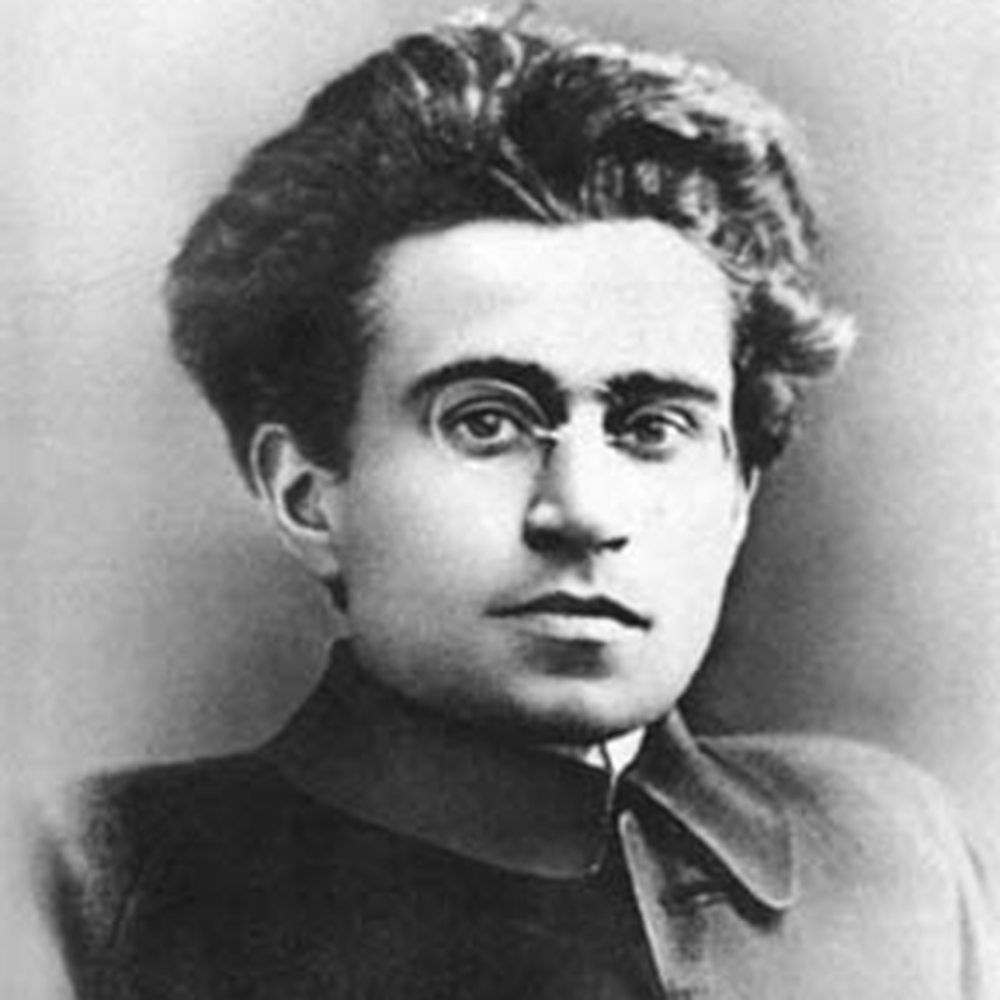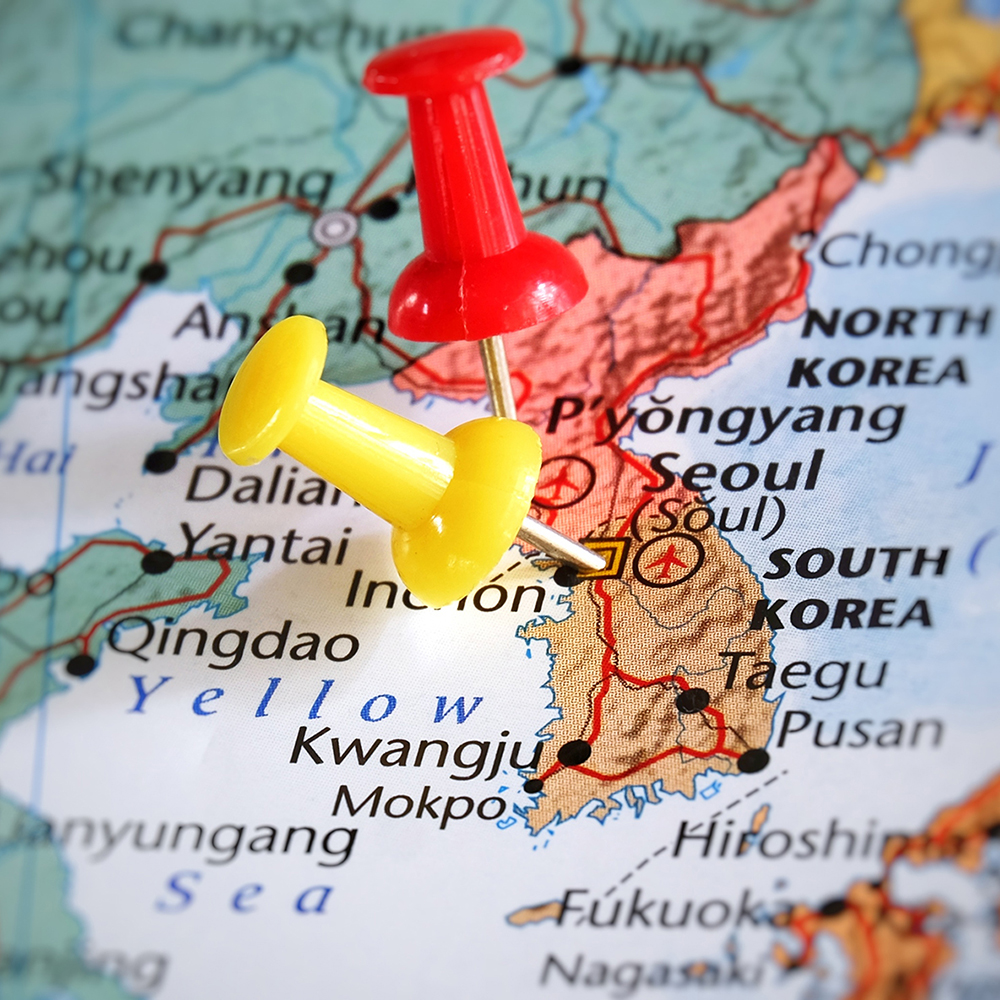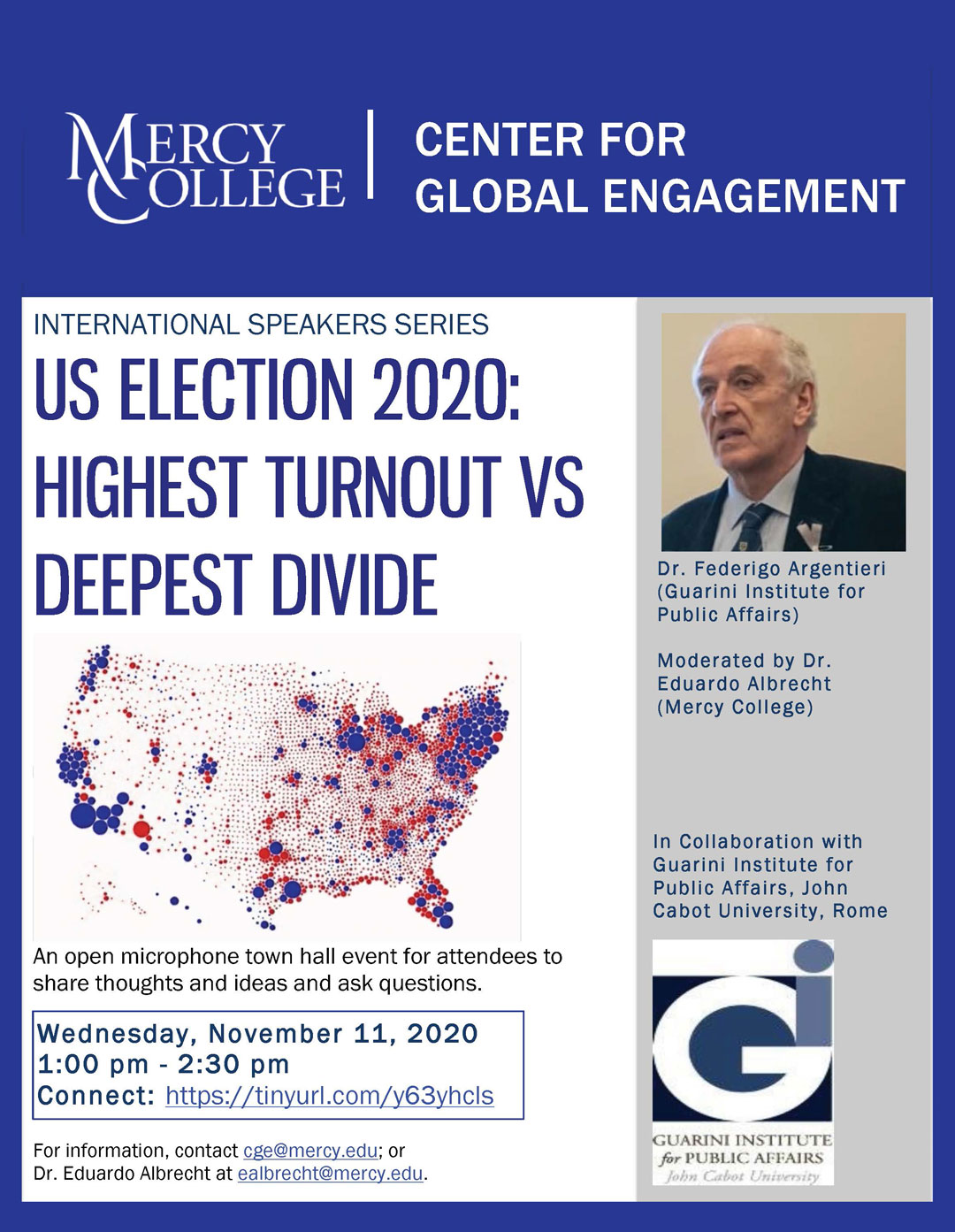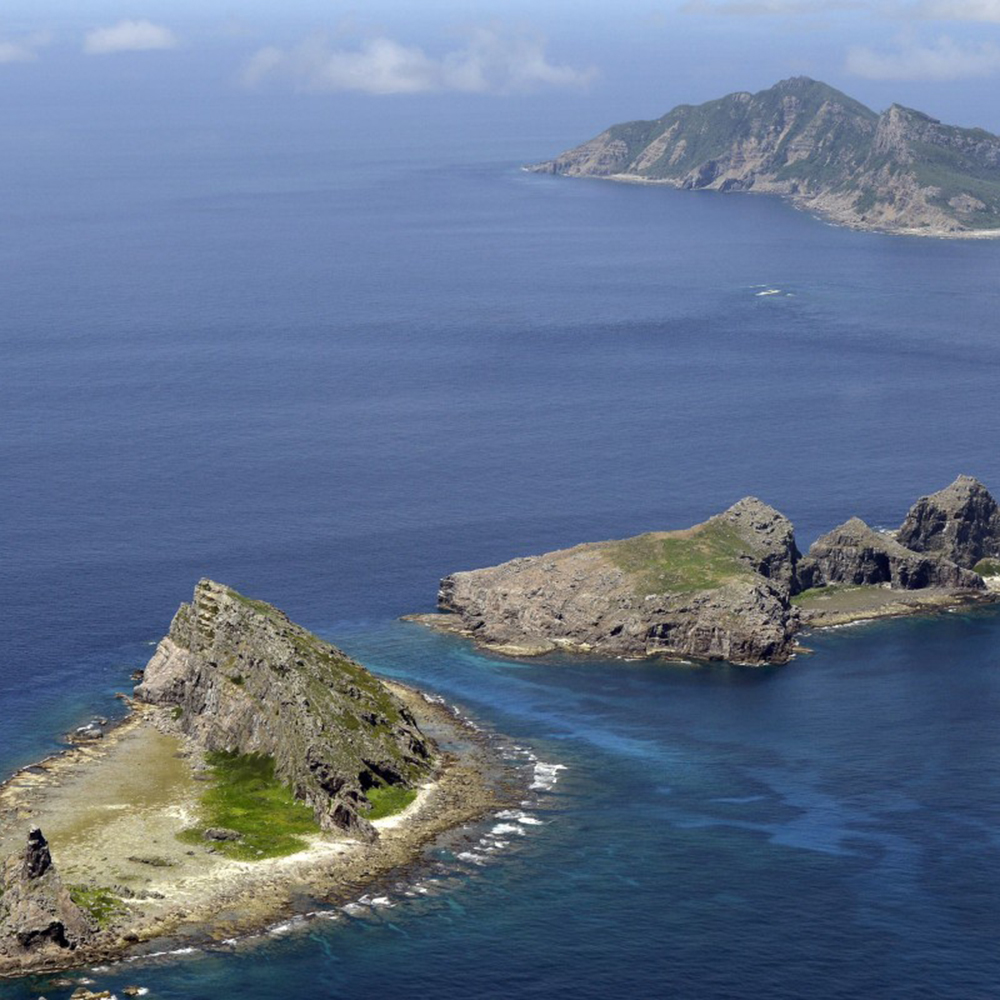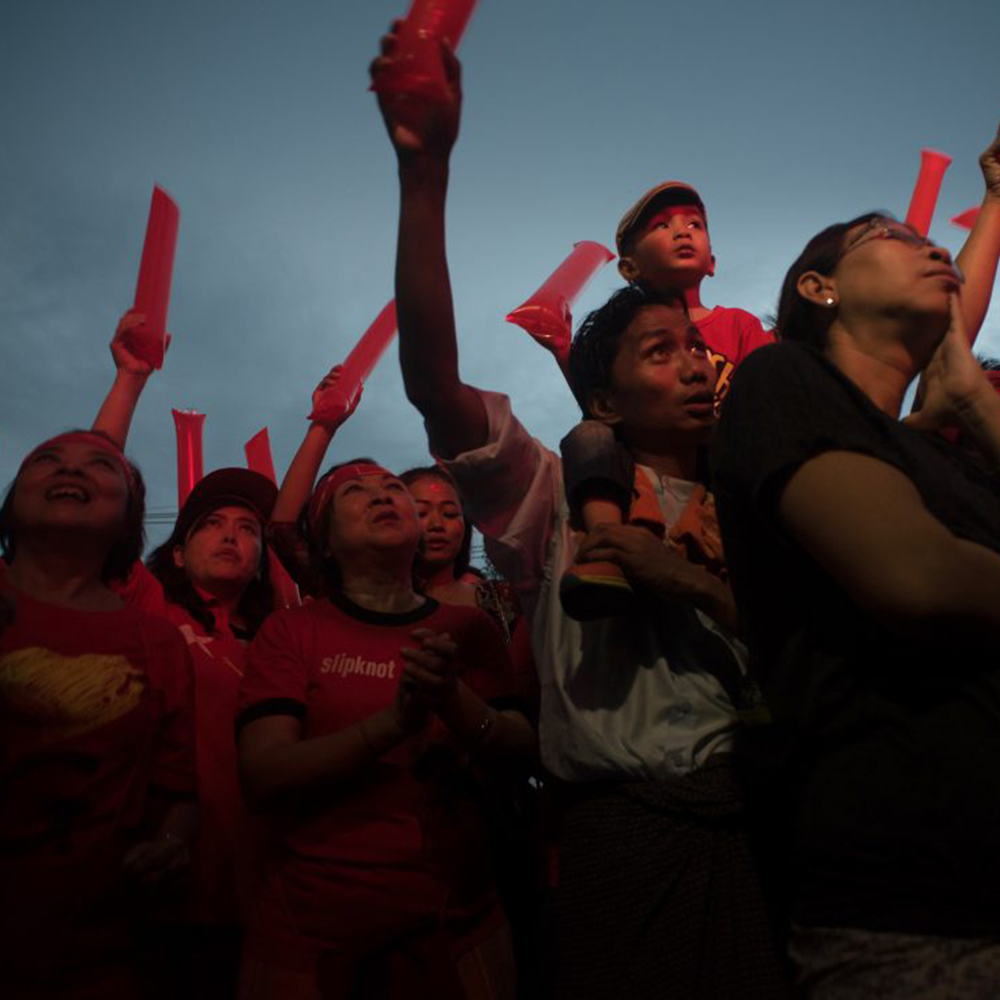William F. Olson Chair in Civic and Cultural Studies for Academic Year 2021–22
From the Office of the Provost, Mercy College.
I am pleased to announce that Dr. Eduardo Albrecht, Associate Professor of International Relations and Diplomacy in the Department of Social Sciences, has been selected for the William F. Olson Chair in Civic and Cultural Studies for Academic Year 2021–22.
The William F. Olson Chair in Civic and Cultural Studies, made possible by a generous donation in April 1997 by William F. Olson, recognizes a professor for distinguished excellence as a Core Faculty member at Mercy College, where the professor's appointment is in the former Civic and Cultural Studies Division (an academic unit under the College's old Divisions organization). The current corresponding disciplines or degree programs include: Political Science; History; Music/Music Production and Recording Arts; Philosophy; Religion; and Art History/Design and Animation. The Selection Committee found that Dr. Albrecht’s work is exemplary of distinguished excellence.
Dr. Albrecht has been teaching for Mercy College since 2015. His research focuses on international political movements and political subjectivity in a range of settings, specifically in Southern Europe and on the Korean Peninsula. He collaborates on an ongoing project that combines data analytics and ethnographic analysis to formulate predictions in international political affairs. Dr. Albrecht involves his students in authentic learning practices, encouraging their deep investigation of current and global issues; participation in Oxford-style debates; and experiential learning opportunities, including undergraduate research.
I congratulate Dr. Albrecht on winning this award. I also thank all applicants for participating in this year’s competition, and members of the selection committee for reviewing the applications.
2011. A Study in Anthropology: The Anti-globalization Movement and the City of Naples. Journal of Mediterranean Studies, 13/1: 121-155.
From September 2002 to July 2003 I conducted fieldwork amongst anti-globalization protestors in Naples, Italy. At the time, anti-globalization ideals and stances were articulated through a large and dynamic protest movement. Young protestors expressed their dissatisfaction with the neo-liberal economic policies of institutions such as the World Banks, the World Trade Organisation and the International Monetary Fund through various activist groups and mass gatherings. In addition to protesting economic globalization, protestors also demanded the dropping of ‘third world debt’, sought to fight environmental degradation and pushed for the recognition of the rights of indigenous peoples amongst other things.
2011. Aesthetic Surgery and Social Change in South Korea. Korean Cultural Anthropology, 44/2: 359-389.
The intention of this paper is to set out some possible research directions for an ethnographic study of aesthetic surgery in South Korea. To do this, I advance an initial hypothesis: that changes on the body somehow reflect the broader social changes occurring in South Korean society. Does the relative popularity of aesthetic surgery amongst South Korean women reveal an ``ideology of the possible``, in which anything and everything is subject to change, renewal, amelioration? What is the nature and significance of such an ideology, and what are the implications for the way women view and manage their bodies?
2011. Experiences of State, Family and Body amongst North Korean Defectors Living in Seoul. Journal of Northeast Asian Cultures, 26/1: 579-600.
The Talbukja, a term used to denote ‘escape from the north’, interviewed in this paper have all fled their rural towns along the Tumen river in north-eastern North Korea to find themselves in Seoul, South Korea, one of the most dynamic megacities in the world. What is their view of this change? Do they incur any physical discomfort? How would they describe their relationship with their new surroundings?
To explore these aspects, the methodology involved conducting qualitative interviews with questions pertaining to the five senses. I asked questions such as what sights stand out in Seoul, what sounds are new or different, what tastes and what smells do you like or dislike? From these cue questions, the interviewee would then take the discussion in different directions, freely making associations to his or her personal like and experience as a refugee.
2012. Italian Labor Market Reform: An Appraisal of the 2003 Biagi Law. Mediterranean Review, 5/1: 21-44.
This article looks at the major historical developments in the Italian labor market, with specific attention given to the ‘Biagi Law’ that attempted to reform it in 2003. The name refers to Professor Marco Biagi, who was advising the government on the reforms at the time. The article will explore whether the objectives of the reforms were eventually achieved. This question will be addressed using an historical-descriptive methodology that focuses on the social and political context. The article concludes that the Biagi Law is only part of a much longer reform process that has been unfolding since at least the mid-1980s. This process is nowhere near completion today, and, especially in the case of the Biagi Law, has met with much resistance from state and non-state actors. The article uses data on unemployment figures in Italy and in the OECD in the decade from 2000 to 2010.
2013. Antonio Gramsci’s Political Philosophy and European Integration: A Review of Competing Perspectives in Contemporary Italy. Mediterranean Review, 6/2: 91-113.
This paper reviews competing contemporary perspectives on the political philosophy of Antonio Gramsci and relates them to the analysis of European integration today. The first part of the paper looks at the different conceptualizations of Gramsci`s thought as set out by two contemporary Gramsci experts in Italy, Marcello Montanari and Francesca Izzo. The second part of the paper considers which of the competing perspectives may be best suited for understanding the current political situation in Europe, and concludes that Montanari`s conceptualization is more relevant to this task. That conceptualization is then used to critically assess the current state of European integration; and, in particular, the role of member state governments, the emphasis on economic integration, and the preeminence of centralized institutions in directing the process of integration.
2014. A Review of the Chinese, Russian, US and EU Strategies in the Korean Peninsula from 2006-2012, Journal of Northeast Asian Studies, 71/1: 323-346.
This study will look at the strategic relationships between China, Russia, the US and the EU as they relate to the Korean Peninsula, and at the rising and falling levels of trust between them. It is necessary, therefore, to start by defining more precisely what is meant by the term trust.This is a vague concept, as there are multiple ways of conceiving it. Nevertheless, if we are to accurately measure the level of trust between the different international actors in relation to the Korean Peninsula then we must find a way of defining it. In the field of International Relations, the existence of trust among two or more actors indicates “a willingness to take risks on the behavior of others based on the belief that potential trustees will do what is right.”
Read Article
Elections 2020
Many have done and are doing a great job describing the legal and political ways that the 2020 elections have been “historical” and “unique.” So I will steer away from that, and instead I would like to give a few broad stroke observations of what I believe are the wider societal transitions underway. These societal transitions underpin many of the political divisions we have been witnessing, and they can be described as:
1) A transition away from political parties as representative of ideological beliefs, to parties as representative of biological identities. Of course, this is not an overt nor formal position of the parties, but it has been amplified by a media quick to promote stereotypes and it is starting to take on deep psychological meaning for many voters. This development historically has been a precursor of political violence.
2) The parallel expansion of two distinct ecosystems of mass media that are in a de-facto state of incommunicado. On the one hand an institutionally owned and endorsed system of news media, social media, and professional network based public conversations (of which this very event is a part). On the other a decentralized and unruly ecosystem of fringe opinions and unconventional beliefs. This second system “hacks” the first, as in it uses the former’s infrastructure but without the former’s sanction. Like an immune system fighting off a virus, the official system finds itself scrambling to discredit, disqualify, and de-platform the hackers. It is an interesting development that the current President of the United States is now officially a hacker, posting what a Twitter algorithm qualifies as misleading and incorrect information. A civil servant, legally if not emotionally, represents the entire nation, from which he or she gets his or her mandate. A private entity is mandated by its shareholders. This public-private tension over the public discourse will not be easy to figure out.
3) A silent, yet profound, division over the role of the constitution and in particular between those that champion “unalienable rights” versus those that champion “positive rights.” Unalienable rights are those that cannot be taken away by government (right to speech, faith, happiness), positive rights are those that government should proactively give to individuals (right to shelter, food, safety). The balance between the two defines the role of the state and the very meaning of freedom (freedom “from the state” alongside freedom “guaranteed by the state”). Both have a role to play in our modern social contract.
Too much freedom from the state can lead to chaos, injustice, exploitation, and too much freedom guaranteed by the state can lead to tyranny (as it opens the struggle for power over control of those freedoms). Yet when half of society only sees and cares about their unalienable rights, and the other half only sees and cares about their positive rights, it no longer becomes a matter of how to mix the two, but of pitting the one against the other. Getting that balance right is possible when both sides see the value and danger of the other side. I believe we are not just witnessing a “historic” election, but a re-definition of the social contract.
2014. A Review of the Social, Cultural, Political and Economic Dimensions of the Senkaku/Diaoyu Island Dispute, with Betty Chemier. Journal of Northeast Asian Cultures, 39/1: 491-514.
This research will analyze the Senkaku/Diaoyu situation by looking at the relationship between the economic, political, social and cultural aspects of the dispute. The methodology used will be a review of various American, Japanese, Chinese and Korean authors that have written on the dispute. This literature review will allow us a more accurate assessment of the economic, political, social and cultural phenomena that influence the territorial dispute. Finally, this paper will contribute to the literature on the dispute through a discussion on the relationship that exists between the different dimensions, and particularly how each dimension influences the other. Economically, the expected reward is the oil and gas that is believed to be in the disputed area. However, we also find that as tensions over the islands rise, trade relations between the two countries are negatively affected. The need to preserve the economic benefits of trade stops the conflict from ever escalating beyond a certain point. The political relationship has been following a similar dynamic. Despite the use of acrimonious rhetoric, both countries proved willing to co-operate politically whenever the long term relationship was at risk. This leads us to conclude that the bilateral political relationship is largely at the service of the economic and trade relationship that exists between the countries. Yet, from this review, it is clear that what has most contributed to keeping the dispute alive are social and cultural factors and the impact they have on the domestic politics of both countries. Reviewing the economic and diplomatic aspects of the dispute, we often noted that patriotic sentiments have a strong impact on the development of events. The islands are a nationalistic symbol for conservatives in both countries, where politicians often use this symbol for their own domestic political advantages.
2014. Democratization and Good Governance in Myanmar/Burma, with Amit Arora. Journal of Corruption Studies, 19/1: 211-234.
This paper looks at the current changing dynamics of politics in Burma. The paper will investigate what steps have been taken to strengthen and foster its economic, political and civil society. The dramatic political reforms occurring in Burma today, such as the new constitution and the recent elections, are the first tentative footsteps being taken toward democracy after more than 60 years of independence. We will seek to answer the question: what new doors of good governance are being opened for Burmese citizens? According to the United Nations Economic and Social Commission for Asia and the Pacific, good governance is a governance ideal that is founded on 8 major characteristics.

